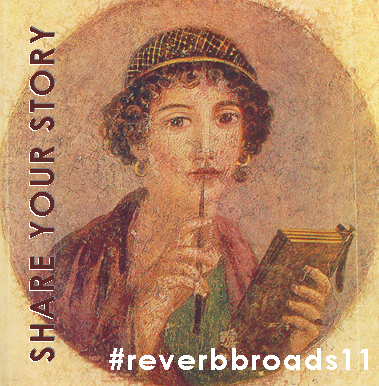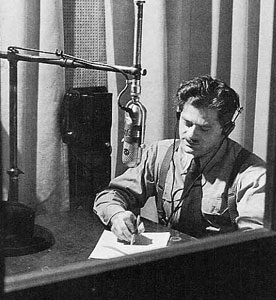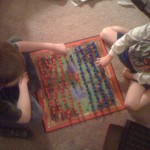 Ancient History, Psychology
Ancient History, Psychology  2 Comments
2 Comments Dear previous me … : Reverb Broads 2011 #1
 I don’t have many reasons to write creatively (or any other way) in the course of everyday life. That’s no criticism of my work or my family life, just a statement of fact, similar to my frequent lament that intellectual conversation can be hard to come by as well. And NaNoWriMo isn’t my deal, because while I very much enjoy writing descriptions and dialogue, my plotting skills are woefully inadequate.
I don’t have many reasons to write creatively (or any other way) in the course of everyday life. That’s no criticism of my work or my family life, just a statement of fact, similar to my frequent lament that intellectual conversation can be hard to come by as well. And NaNoWriMo isn’t my deal, because while I very much enjoy writing descriptions and dialogue, my plotting skills are woefully inadequate.
I’ve been really enjoying the mental and spiritual exercise of writing this blog, and only the lack of regular direction has kept me from writing even more entries. So you can imagine my delight when my friend Dana Carlisle Kletchka pointed her fellow blogifying females at Reverb Broads 2011. The organizers have assembled a fun and daunting set of prompts, and an impressive list of clever women to write on them.
So, today it begins with the first prompt: If the you of today could go back in time and give advice to any of the previous yous, which age would you visit and what would you tell them?
I maintain that I wouldn’t change anything in my life, because I’ve ended up almost exactly where I want to be. But there are just two points where a bit of perspective might have helped me endure, or not endure, as the case may be.
I would tell my 15 year old self that, though leaving the faith of my mother and her mother would be a scary thing to do, Christianity was not the world view that would feed my soul or bear me up in the darkest moments of my life. I would tell her that the lessons of faith that I’d observed in those women my whole life would actually inform my search, and that I would recognize the ring of truth when I heard it. Most importantly in all of this, I would tell her that setting out to find our way wouldn’t mean a life without spiritual community — there are so many more people on that road, who will love and support your search, than you ever dreamt. In fact, there’s a whole religion devoted to that free and responsible inquiry.
I would go back to my 18 year old self and tell her that I’m worth better treatment in relationships than I’d received so far. I already had a fairly warped view of what I should expect from significant others — I had experienced the wildly romantic, but I also thought I would never be enough for anyone, and I’d put up with some pretty egregious and thoughtless exploitation. I would tell 18 year old me that she isn’t wrong in thinking she would have to go to the ends of the earth to find the person who would complete us, but not to worry — the Internet would turn out to be a much bigger thing that any of us thought in 1992.
And I would tell my 24 year old self not to tell my History department that I was considering a semester of medical leave to deal with my fibromyalgia. She didn’t know that they would take “considering” to mean “had decided to,” and that they would screw things up in ways that would never be repaired. I would tell her that fibromyalgia has its ups and downs, that it’s not always going to be as bad as it was right then. It lasts longer than grad school, but grad school has an end, and you can outlast anything finite.
Also, when people ask you to rate your pain, and you tell them that you’re leaving 9 and 10 on the scale for childbirth? You’re totally right.
Finally, I would tell 30 year old me that the odd things about her beautiful, hilarious son aren’t her fault. Sure, he’s been doomed to geekdom since before his conception — that will only enrich his life. But all those strange, inexplicable, seemingly unconnected things? They’re real, they’re something, and they’re not caused by bad parenting. And finding out about the Asperger’s Syndrome that underpins them all will reveal a piece of our own self that we never imagined existed, lighting up connections that have dwelled in dark mystery since our earliest days. I would tell her to be kind and patient to him, and to herself, even at those most frustrating moments when it looks like he’ll have to fight the same battles we’ve already struggled through.
And to all the previous mes: be easy with yourself. People will love and value you, not just despite all your weirdness — they’ll love and value you for it.

